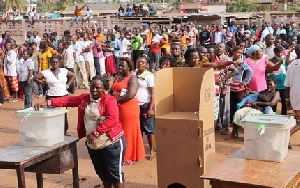The Institute of Democratic Governance (IDEG) has described as alarming the high rate of rejected ballot papers recorded at some polling stations in the country during general elections.
The institute said the phenomenon, if not checked, could have consequences on Ghana’s democratic credentials.
Senior research fellow at IDEG Dr Kwesi Jonah made the remarks at a convention on media for an undisputed Election 2016 organised by the Ghana Journalists Association in Kumasi on Thursday March 17.
Dr Jonah, however, wants political parties to get involved in educating the Ghanaian voter on the process.
“When civil society organisations do voter education, they are interested in encouraging as many people to go to the polls to vote….In this country the problem of rejected ballots is becoming more and more serious,” he stated.
“Sometimes you can have as many as 250,000 ballots spoilt. You know what it means - there are constituencies where people win elections with 50,000 votes, so, if 250,000 votes are completely rejected you know the implication - what this means is that 250,000 citizens of this country could not make any impact in the election because their votes did not count at all.
“Here, the political parties should also take interest because the 250,000 votes that have been rejected, who lost them? The parties and their candidates lost them?”.
Politics of Friday, 18 March 2016
Source: classfmonline.com

















